Influencer Marketing for Social Media: Transforming Your Social Strategy
In the ever-evolving world of social media, it’s crucial for businesses to stay ahead and adapt their strategies to maximize their impact. One powerful technique that has taken the digital marketing world by storm is influencer marketing. By leveraging the power and influence of individuals with large followings on platforms like Instagram, YouTube, and TikTok, businesses can use influencer marketing for social media to transform their strategy and achieve unparalleled results.
Influencer marketing allows brands to tap into the trust and authenticity that influencers have built with their audiences. By partnering with influencers who align with their values and target audience, brands can reach a wider audience, increase brand awareness, and drive meaningful engagement. Unlike traditional advertising, influencer marketing feels more organic, as influencers seamlessly integrate products or services into their content, making it feel like a genuine recommendation rather than a blatant advertisement.
Moreover, influencers have the ability to create highly engaging and shareable content that resonates with their followers. This content can help brands build credibility, generate user-generated content, and boost social proof, ultimately leading to increased conversions and sales.
In this article, we will delve into the world of influencer marketing and explore how it can transform your social media strategy, driving tangible results for your business.
What Is Influencer Marketing?
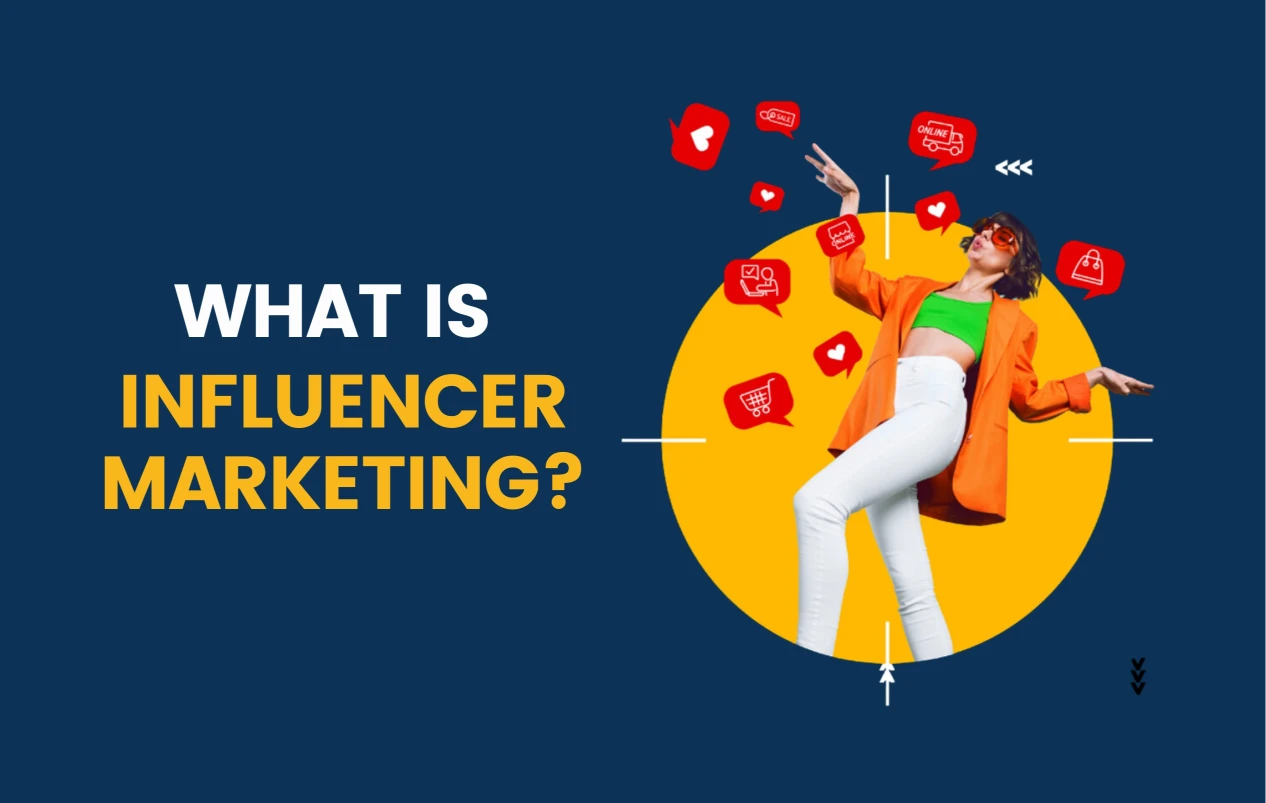
Influencer marketing is a form of marketing that focuses on leveraging the influence and reach of individuals who have a significant following on social media platforms. These individuals, known as influencers, have built a loyal and engaged audience who trust their recommendations and opinions. Influencer marketing involves collaborating with influencers to promote products or services to their followers in an authentic and effective way.
There are different types of influencers, ranging from macro-influencers who have millions of followers to micro-influencers who have smaller but highly engaged audiences. The key is to find influencers who align with your brand’s values, target audience, and marketing goals.
Influencer marketing has gained popularity due to its ability to cut through the noise of traditional advertising and reach consumers in a more organic and genuine way. By leveraging the trust that influencers have built with their followers, brands can effectively tap into new markets, increase brand awareness, and drive conversions.
The Power of Influencer Marketing in Social Media
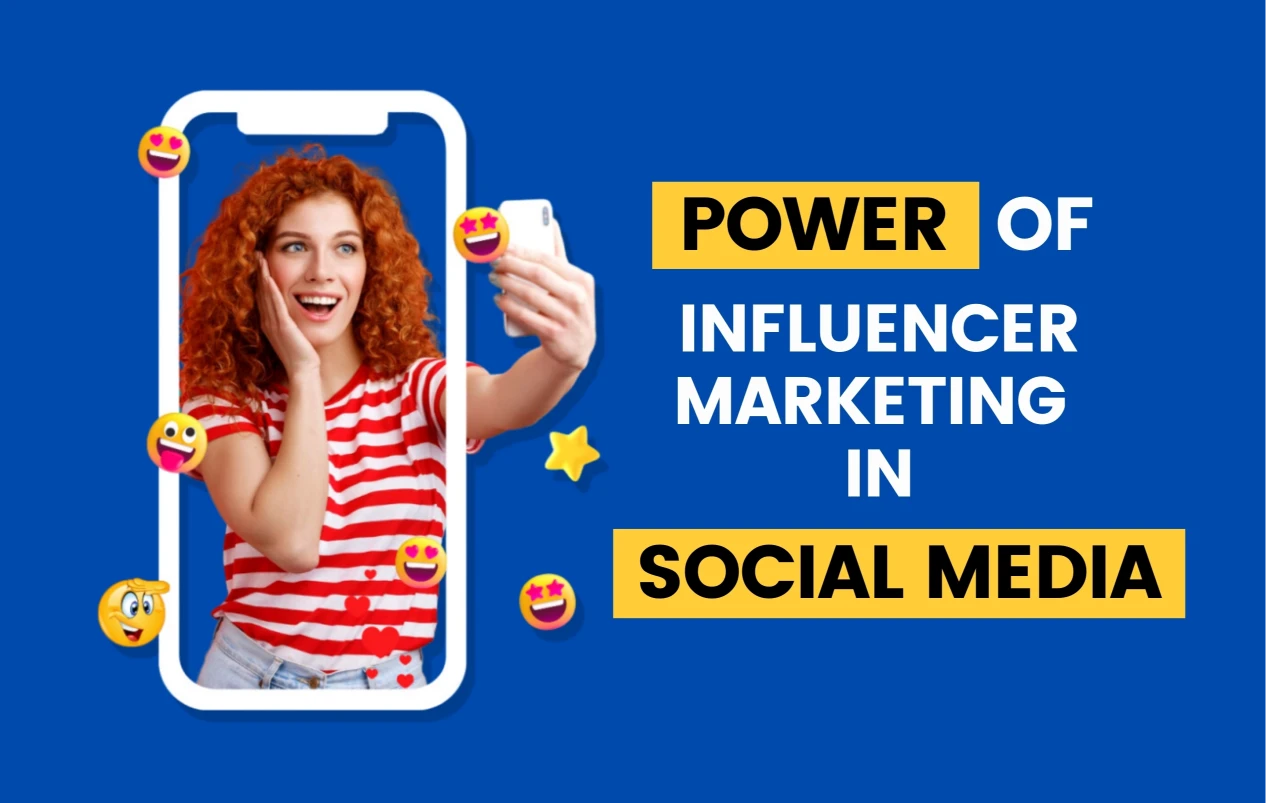
Social media has become an integral part of people’s lives, with billions of users actively engaging on platforms like Instagram, YouTube, and TikTok. Influencer marketing harnesses the power of these platforms and the influence of popular individuals to create impactful marketing campaigns.
The power of influencer marketing lies in its ability to reach a highly targeted and engaged audience. Influencers have developed a strong connection with their followers, who trust their opinions and recommendations. When an influencer promotes a product or service, it feels like a genuine recommendation, which resonates with their audience and drives action.
In addition to reach and engagement, influencer marketing also offers the opportunity for brands to tap into niche markets. With the rise of micro-influencers, who have smaller but highly engaged audiences, brands can target specific demographics and interests. This allows for more precise targeting and higher conversion rates.
Another key aspect of influencer marketing is the ability to generate user-generated content (UGC). When influencers promote a brand, their followers often create content around the product or service, sharing their own experiences and opinions. This UGC not only provides social proof for the brand but also increases brand visibility and awareness.
To fully leverage platforms like Instagram, understanding the nuances of Instagram advertising is essential, as it can complement your influencer marketing efforts by reaching an even broader audience.
How Influencer Marketing Works
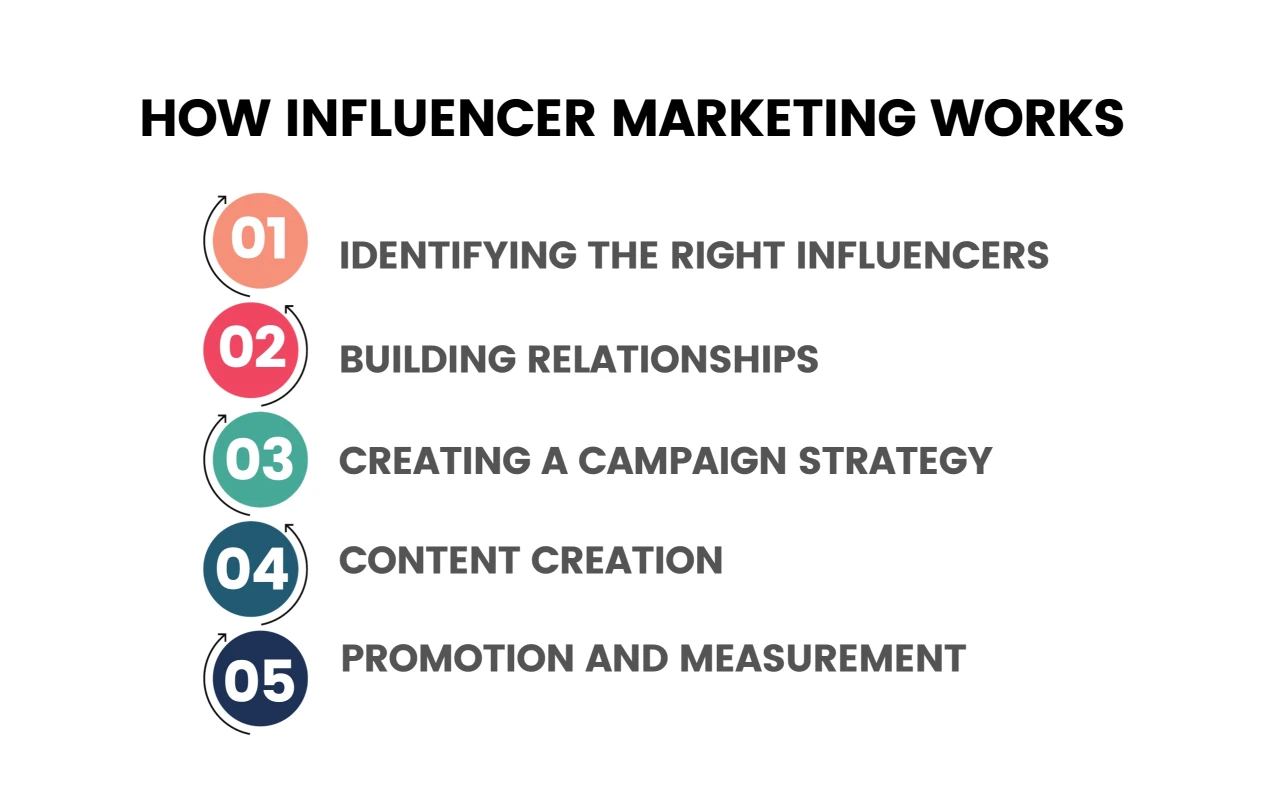
Influencer marketing involves a strategic partnership between a brand and an influencer, where the influencer promotes the brand’s products or services to their followers. The process typically involves the following steps:
1. Identifying the Right Influencers
The first step in influencer marketing is finding influencers who align with your brand’s values, target audience, and marketing goals. This requires research and analysis to ensure a good fit.
2. Building Relationships
Once the right influencers have been identified, the next step is to build relationships with them. This involves reaching out to influencers, introducing your brand, and discussing potential collaborations.
3. Creating a Campaign Strategy
A successful influencer marketing campaign requires a well-thought-out strategy. This includes defining campaign objectives, determining key messages, and outlining deliverables.
4. Content Creation
Influencers are known for their ability to create engaging and authentic content. The brand and influencer work together to create content that aligns with the campaign objectives and resonates with the influencer’s audience.
5. Promotion and Measurement
Once the content is created, influencers promote it on their platforms. Brands track the performance of the campaign, measuring metrics such as reach, engagement, and conversions.
A key component of influencer marketing is video marketing, which enables influencers to create dynamic, engaging content that resonates with their audience on platforms such as YouTube and TikTok.
Finding The Right Influencers for Your Brand
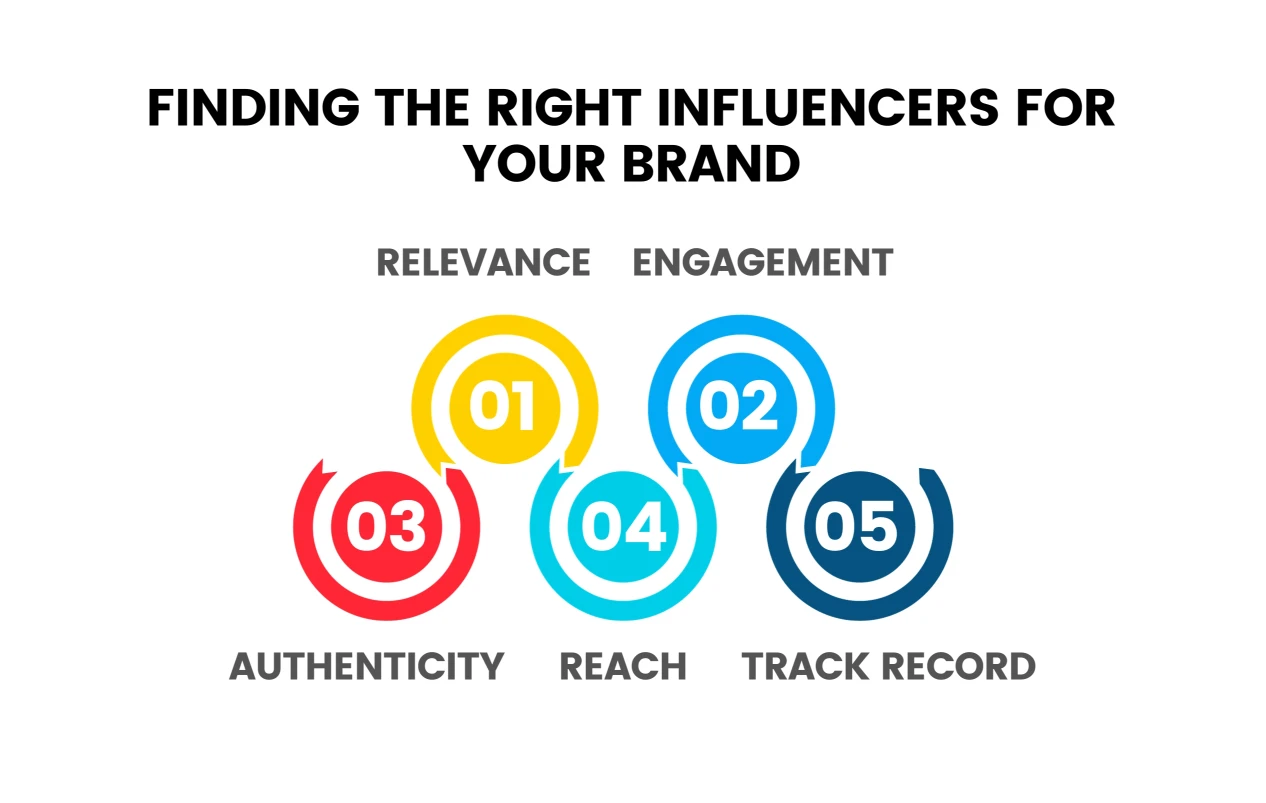
Finding the right influencers for your brand is crucial for the success of your influencer marketing campaign. Here are some key factors to consider when identifying influencers:
1. Relevance
Look for influencers who are relevant to your industry or niche. Their content should align with your brand’s values and target audience.
2. Engagement
Evaluate an influencer’s engagement rate, which measures the level of interaction their posts receive. High engagement indicates an active and loyal audience.
3. Authenticity
Authenticity is key in influencer marketing. Look for influencers who have built a genuine connection with their followers and have a track record of promoting products in an authentic way.
4. Reach
Consider the size of an influencer’s following and their reach. While larger influencers may have a broader reach, smaller influencers often have a more engaged and niche audience.
5. Track Record
Research an influencer’s previous collaborations and campaigns. Look for influencers who have successfully worked with brands in the past and have a positive track record.
Building Relationships with Influencers
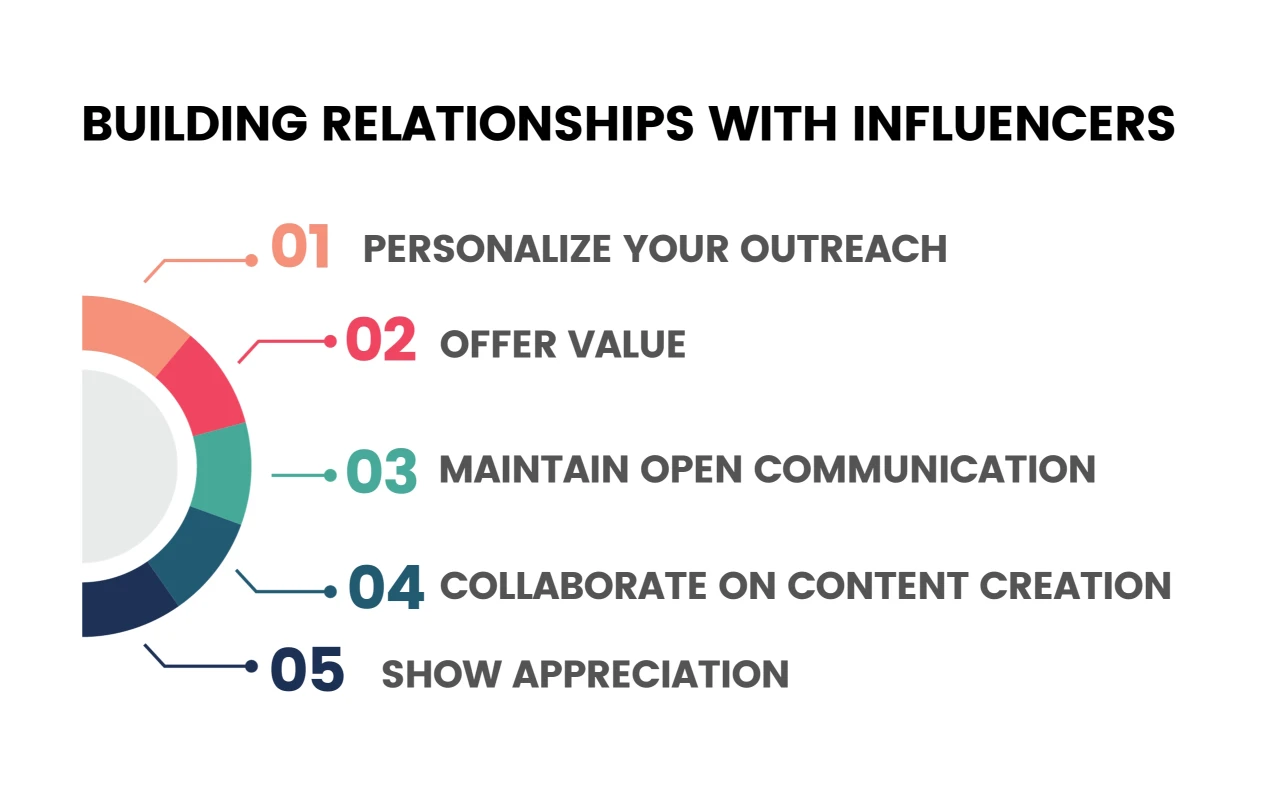
Building strong relationships with influencers is essential for successful influencer marketing campaigns. Here are some tips for fostering positive relationships with influencers:
1. Personalize Your Outreach
When reaching out to influencers, take the time to personalize your message. Show that you have done your research and explain why you believe they would be a good fit for your brand.
2. Offer Value
Influencers receive numerous collaboration requests, so it’s important to offer them value. Whether it’s financial compensation, free products, or exclusive experiences, make sure to provide something that benefits them in return for their partnership.
3. Maintain Open Communication
Establish clear lines of communication with influencers throughout the collaboration process. Be responsive to their questions and concerns and keep them updated on campaign progress.
4. Collaborate on Content Creation
Involve influencers in the content creation process. Give them creative freedom to create content that resonates with their audience while aligning with your brand guidelines.
5. Show Appreciation
After a successful collaboration, show appreciation to influencers by thanking them and sharing the results of the campaign. This helps build long-term relationships and encourages future collaborations.
When developing collaborations, it’s crucial to integrate influencer insights into your local branding tactics to ensure the content is both authentic and aligned with your brand identity.
Creating an Effective Influencer Marketing Campaign
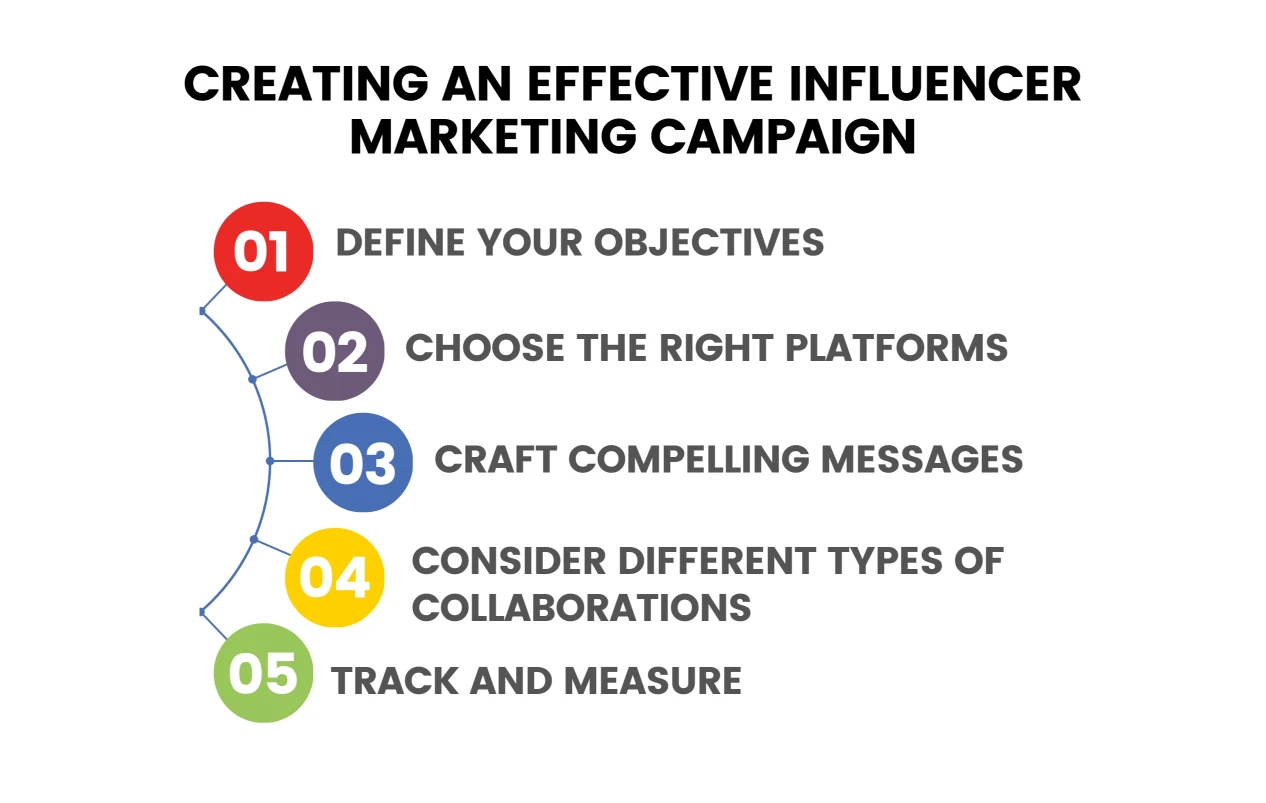
Creating an effective influencer marketing campaign requires careful planning and execution. Here are some key steps to consider:
1. Define Your Objectives
Clearly define the objectives of your influencer marketing campaign. Whether it’s increasing brand awareness, driving sales, or generating user-generated content, having clear goals will guide your strategy.
2. Choose the Right Platforms
Select the social media platforms that align with your target audience and campaign objectives. Different platforms have different demographics and engagement levels, so choose wisely.
3. Craft Compelling Messages
Work with influencers to craft compelling messages that resonate with their audience. The content should be authentic, engaging, and align with your brand’s values.
4. Consider Different Types of Collaborations
Influencer marketing offers a variety of collaboration options, from sponsored posts to product reviews and giveaways. Choose the type of collaboration that best suits your objectives and budget.
5. Track and Measure
Use analytics tools to track the performance of your influencer marketing campaign. Monitor metrics such as reach, engagement, website traffic, and conversions to evaluate its success.
Measuring the Success of Your Influencer Marketing Efforts
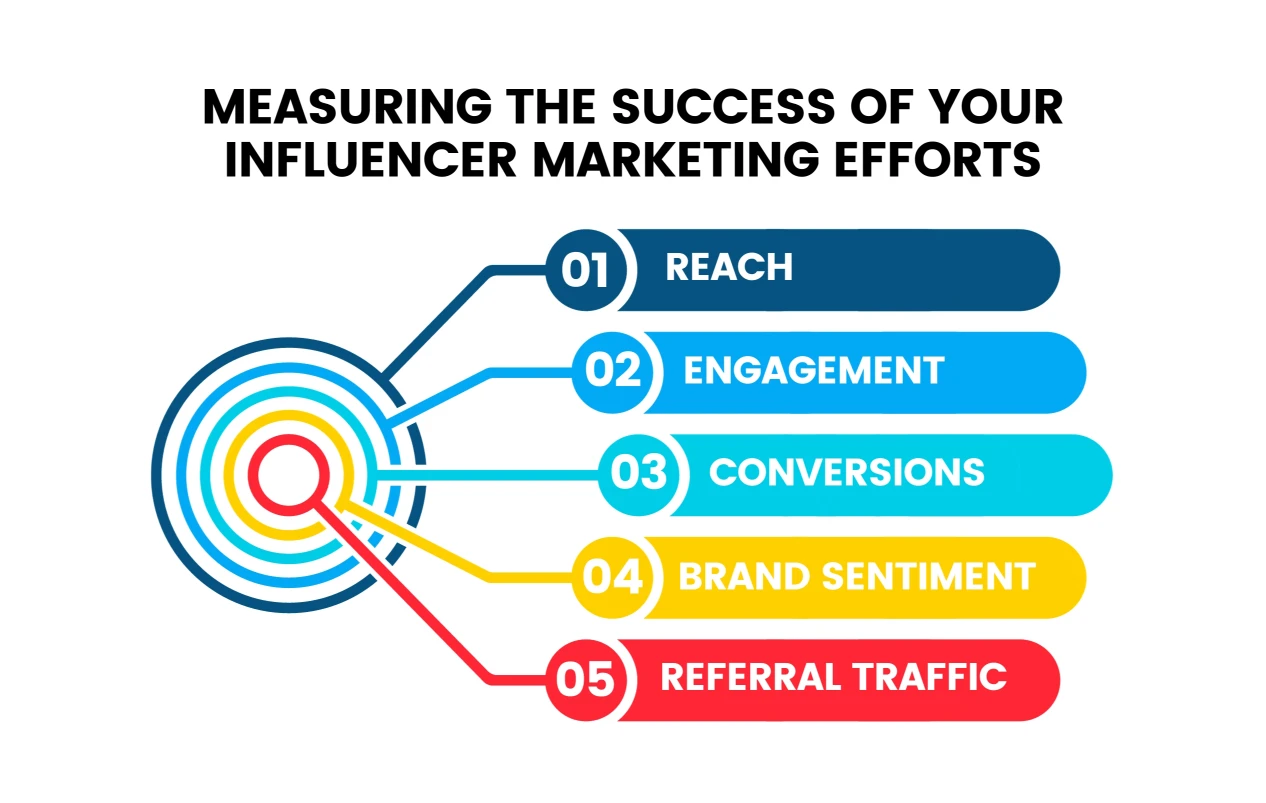
Measuring the success of your influencer marketing efforts is essential to determine the return on investment (ROI) and optimize future campaigns. Here are some key metrics to consider:
1. Reach
Measure the number of people who have been exposed to your influencer marketing campaign. This can be measured through reach metrics provided by the social media platforms or through tools like Google Analytics.
2. Engagement
Evaluate the level of engagement your campaign has generated. Look at metrics such as likes, comments, shares, and saves to gauge the level of interaction with the content.
3. Conversions
Track the number of conversions your campaign has generated, whether it’s sales, sign-ups, or downloads. This will help determine the impact of the campaign on your bottom line.
4. Brand Sentiment
Monitor the sentiment around your brand during and after the influencer marketing campaign. Look for shifts in brand perception and sentiment to assess the impact on brand reputation.
5. Referral Traffic
Measure the amount of traffic driven to your website or landing pages through influencer marketing. This can be tracked using UTM parameters and Google Analytics.
Companies looking to optimize their social media presence in specific regions, like Maryland, should research the best social media for business growth in MD, as regional preferences can greatly influence the success of marketing campaigns.
Case Studies: Successful Influencer Marketing Campaigns
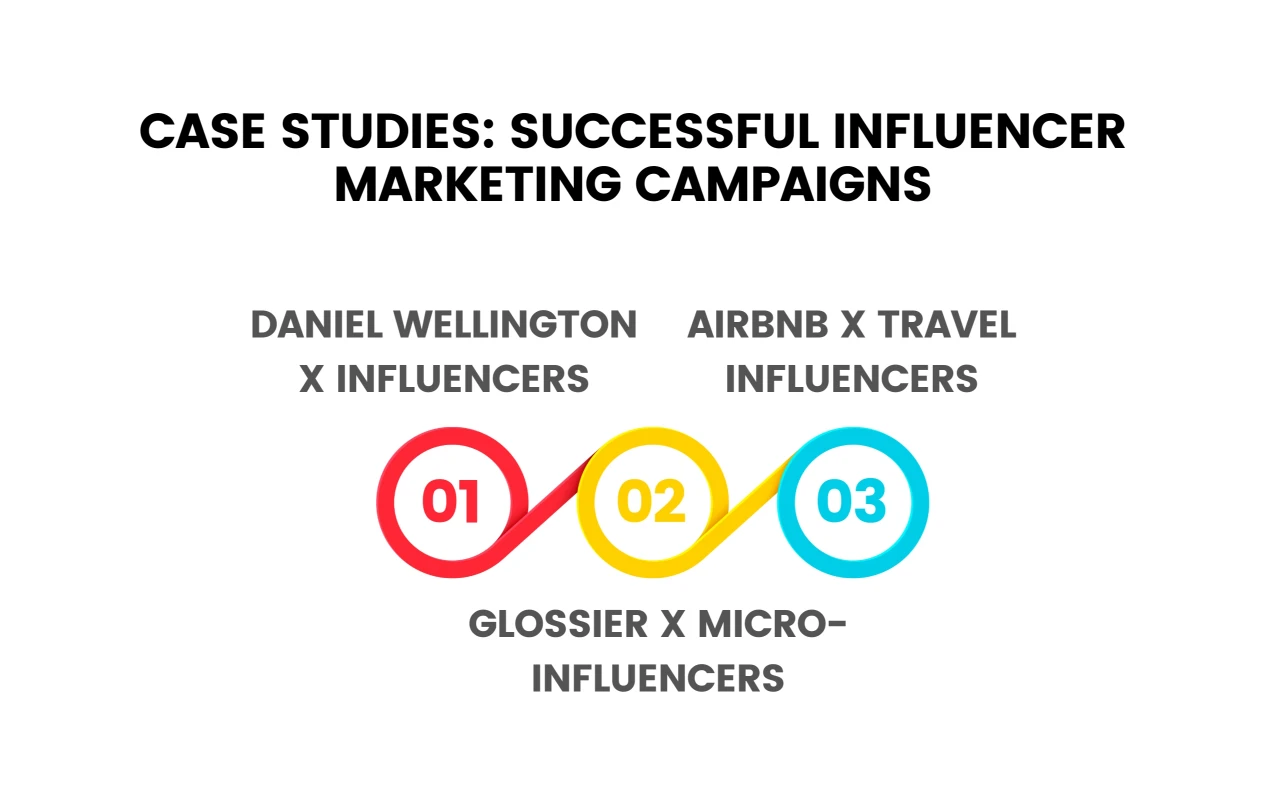
To demonstrate the power of influencer marketing, let’s take a look at some successful campaigns:
1. Daniel Wellington X Influencers
The watch brand Daniel Wellington collaborated with influencers to promote their products on Instagram. By leveraging the influence of fashion and lifestyle influencers, the brand achieved a significant increase in brand awareness and sales.
2. Glossier X Micro-Influencers
Beauty brand Glossier partnered with micro-influencers to promote their skincare and makeup products. The brand’s strategy focused on authenticity and user-generated content, resulting in a highly engaged and loyal community of brand advocates.
3. Airbnb X Travel Influencers
Airbnb teamed up with travel influencers to showcase unique accommodations and travel experiences. By leveraging the influencers’ expertise and storytelling abilities, Airbnb created aspirational content that inspired wanderlust and increased bookings.
Common Mistakes to Avoid in Influencer Marketing
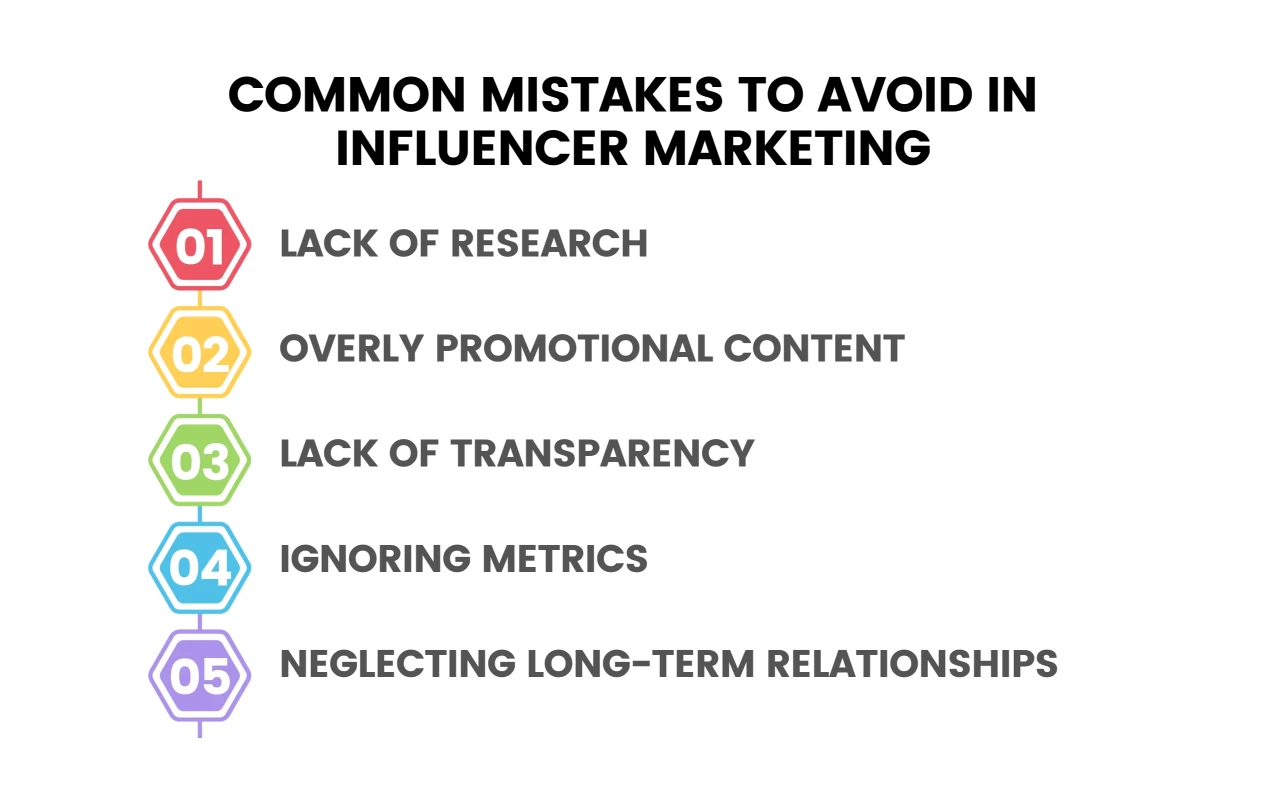
While influencer marketing can be highly effective, there are common mistakes that brands should avoid:
1. Lack of Research
Failing to research and vet influencers can result in partnerships that are not aligned with your brand’s values or target audience.
2. Overly Promotional Content
Influencer marketing works best when it feels authentic and organic. Avoid creating content that appears overly promotional or like a blatant advertisement.
3. Lack of Transparency
Disclose any partnerships or sponsored content to maintain transparency and comply with advertising regulations. Failure to do so can damage your brand’s reputation.
4. Ignoring Metrics
Measure the success of your influencer marketing campaigns to optimize future efforts. Ignoring metrics can result in missed opportunities for improvement and growth.
5. Neglecting Long-Term Relationships
Building long-term relationships with influencers can lead to more effective collaborations and increased brand loyalty. Don’t just focus on one-off campaigns, but invest in nurturing relationships with influencers.
Conclusion: Harnessing The Power of Influencer Marketing for Social Media Success
Influencer marketing has emerged as a pivotal strategy in the realm of social media, offering businesses a dynamic avenue to amplify their reach and resonate with audiences in a more authentic and personal manner. This approach revolves around collaborating with influencers who have cultivated significant followings on platforms like Instagram, YouTube, and TikTok. The core strength of influencer marketing lies in the trust and rapport these influencers have established with their audience, enabling brands to engage with consumers through a more organic and relatable narrative compared to traditional advertising methods. The effectiveness of this strategy is evident in its ability to foster genuine connections, drive user-generated content, and bolster brand credibility, ultimately translating into increased conversions and sales. To harness the full potential of influencer marketing, it is crucial for brands to carefully select influencers who align with their ethos and audience, focusing not just on reach but also on engagement and authenticity. Building enduring relationships with influencers, crafting compelling and authentic messages, and strategically leveraging different types of collaborations are key elements of a successful campaign. Measuring the impact through metrics like reach, engagement, conversions, brand sentiment, and referral traffic is vital in assessing the ROI and refining future strategies. By adeptly integrating influencer marketing into their social media tactics, brands can not only achieve heightened visibility and engagement but also foster a loyal community of advocates, paving the way for sustained growth and success in the digital landscape.
For businesses seeking to maximize their influencer marketing strategies, partnering with an expert social media management services can provide the necessary expertise and resources to effectively navigate the complexities of social media platforms.
